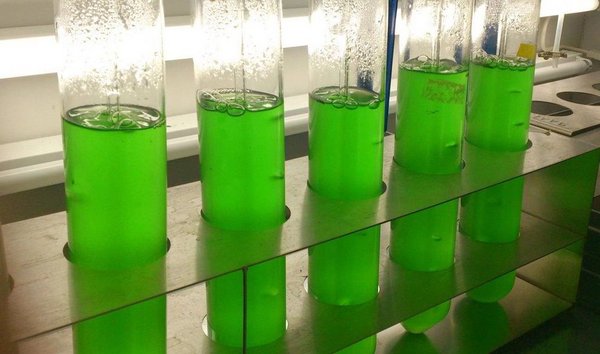- Share this article
- Subscribe to our newsletter
Unusual sugar consisting of cyanobacteria – substitute for glyphosate?
Researchers at the University of Tübingen in Germany have discovered a natural substance that could compete with the controversial herbicide glyphosate. The newly discovered sugar molecule originating from cyanobacteria inhibits the growth of various microorganisms and plants, but is harmless to humans and animals.
The joint study was headed by Klaus Brilisauer, Stephanie Grond of the Institute of Organic Chemistry and Karl Forchhammer of the Interfaculty Institute of Microbiology and Infection Medicine. It appeared in the specialist journal Nature Communications early in February.
Agents used for pharmaceutical or agricultural purposes often originate from natural substances. The latter can consist of complex chemical structures, but may also be relatively simply structured. Often, the ingenuity of such agents lies in their simplicity. So-called antimetabolites interact with vital processes in the cell by copying metabolic products. The result is a disruption of the effected biological process, which leads to growth inhibition or even the death of the cell that has been hit.
The Tübingen research team consisting of chemists and microbiologists have now hit upon a very unusual antimetabolite with an incredibly simple chemical structure: a sugar molecule going by the scientific name of “7-desoxy-Sedoheptulose” (7dSh). Unlike common carbohydrates, which as a rule provide energy for growth, this substance inhibits the growth of various plants and microorganisms such as bacteria and yeasts. The sugar blocks an enzyme of the so-called shikimate pathway, a metabolism route that only occurs in microorganisms and plants. For this reason, the scientists regard the agent as harmless to humans and plants, and they have already proven this in initial experiments.
Deoxy sugar – a natural herbicide that is harmless for humans and animals
The rare deoxy sugar was isolated from cultures of the freshwater cyano-bacterium Synechococcus elongatus, which is capable of inhibiting the growth of related bacteria strains. Looking for the cause of this growth inhibition, the researchers succeeded in decoding the structure of the natural substance. A newly developed method to produce 7dSh, so-called chemo-enzymatic synthesis, has enabled the conducting of extensive surveys elucidating the molecular mechanism of action.
In detail, a modern technology, so-called coupled high-resolution spectrometry, provided accurate insights into the modus operandi of the newly discovered inhibitor. 7dSh blocks DHQS (dehydrochinate synthase), an enzyme in the shikimate pathway.
One of the so far most well-known inhibitors of this pathway is the controversial herbicide glyphosate. “Unlike with glyphosate, the newly discovered deoxy-sugar is an entirely natural product. We expect 7dSh to show good degradability and low ecotoxity,” says Brilisauer, adding that 7dSh demonstrates a promising ability to inhibit plant growth. “This is an excellent opportunity to use it as a natural herbicide.”
The scientists explain that the long-term goal is to eventually replace controversial herbicides, and hence their harmful decomposition products as well. However, they also say that extensive long-term studies have to be carried out to further determine the effectiveness of 7dSh in the field, its degradability in the soil and its harmlessness to the health of useful animals and humans.
(Uni Tübingen/wi)
Publication:
Klaus Brilisauer, Johanna Rapp, Pascal Rath, Anna Schöllhorn, Lisa Bleul, Elisabeth Weiß, Mark Stahl, Stephanie Grond, Karl Forchhammer (2019). Cyanobacterial antimetabolite 7-deoxy-sedoheptulose blocks the shikimate pathway to inhibit the growth of prototrophic organisms. Published in Nature Communications. DOI: 10.1038/s41467-019-08476-8





Add a comment
Be the First to Comment